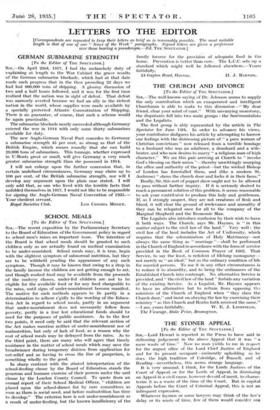SCHOOL MEALS
[To the Editor of TILE SPECTATOR.] Sta.,—The recent exposition by the Parliamentary Secretary to the. Board of Education of the Government policy in regard to school means raises an important issue. The intention of the Board is that school meals should be granted to such children only as are actually found on medical examination to be under-nourished. School meals may, it is true, begin with the slightest symptom of subnormal nutrition, but they are to be withheld pending the appearance of any such symptom. Though it may be known that owing to a drop in the family income the children are not getting enough to eat, and though cooked food may be available from the proceeds of the cookery classes, under-fed children are not to be eligible for the available food or for any food chargeable to the rates, until signs of under-nourishment become manifest. The motive for such methods appears to lie partly in a determination to adhere egidly to the wording of the Educa- tion Act in regard to school meals, partly in an argument that under-nourishment dces not necessarily follow from poverty, partly in a fear lest educational funds should be used for the purposes of public assistance. As to the first two points, it need only be said that the relevant section of the Act makes mention neither of under-nourishment nor of malnutrition, but only of lack of food, as a reason why the cost of school meals may be defrayed from the rates. As to the third point, there are many who will agree that timely assistance in the matter of school meals which may save the breadwinner during temporary distress from application for out-relief, and so having to cross the line of pauperism, is something wholly to the good.
In sharp contrast with the stinted interpretation of the school-feeding clause by the Board of Education stands the generous and humane exercise of their powers under the said clause by the London County Council. To quote from an annual report of their School Medical Officer, " children are placed upon the school-dinner list by care committees as soon as there is social need, and before malnutrition has time to develop." The criterion here is not under-nourishment as a result of under-feeding, but the known insufficiency of the family income for the provision of adequate food in the home. Prevention is better than cure.. The L.C.C. sets up a standard which might well be followed elsewhere.—Yours faithfully,






































 Previous page
Previous page